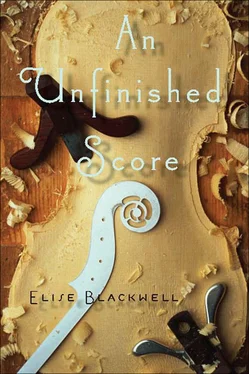One of the guest faculty members halts the peculiar second movement and suggests a stronger entrance by the brass. “Also,” he says, “the strings are trying to rush the crescendos. Is that what you want?” he asks, turning to Suzanne. “It’s your job to speak up.”
From behind her she hears Olivia call out to the orchestra. “Let the conductor hold you, even slow down the crescendo at D. Too slow is better than too fast.”
Suzanne’s throat constricts, and she feels a twitch in a small muscle on the right side of her face. For that brief moment she thinks she is having a stroke. Her recovery is immediate, but still she remains silent, listening to the orchestra play out the Viola Concerto by Alexander Elling and Suzanne Sullivan. With full orchestration and herself in the audience instead of with bow in hand, she hears it for the first time. The concerto was written not to show her off but to ruin her. It was written not out of love but out of hatred.
Again her face twitches, followed by a crushing weight on her chest, and this time it feels not like a small stroke but like the end of everything. She has been wrong all along, spectacularly, humiliatingly, unbearably wrong. And now she has been undone.
As the conductor and concertmaster discuss strategies to prevent the audience from being fully duped and so angered by the false ending. Suzanne stands to leave.
She sees concern on Greg’s face and on Bruce’s, but only fascination on Lisa-Natasha’s as she tries to back away but instead leans over and vomits all over the empty seat in front of her.
Alone in her room, her stomach empty and her arms weak, Suzanne raises her viola and plays the viola line as if for the first time. Just to be sure, she tells herself, though she already knows. She digs her bow hard into her strings, makes every crazy turn, every rise and fall, twisting at the waist so she will not miss a note. Her breath fails her more than once, her right arm aches, and her neck pinches. No matter how much she wants to distrust her instincts, the music is now obvious to her. The concerto is an act of retribution.
Suzanne feels stripped even of profound grief, and the emotion she is left with is shallow and pale, thin as gauze, its color washed away. Doloroso . But nothing more.
She can think of only two ways to stop the farce that Olivia has cast her in: she can call the music director or she can call Olivia. She spins out each scenario. The first one unfolds predictably: there is anger, a scratched program, upset musicians, public exposure, humiliation. The second she imagines in several alternatives, but the truth is that she cannot imagine what will happen if she confronts Olivia because she cannot imagine what Olivia will do. She has overestimated Olivia’s humanity and underestimated her brilliance. She does not know if Olivia cares if her whole plan is exposed — maybe the publicity is even what she wants. Almost certainly she will threaten to talk to Ben. She will tell Ben, and Suzanne will lose him, too.
She thinks of her musical reputation, of the quartet, of Anthony’s aspirations for them all. If the false Wikipedia entry about Alex calling music “a healing force” made headlines and ripped through the online world, how large a scandal might this be? What will its salacious headline be? Will people remember and care? Will they forgive Suzanne because she is the dupe, or is that the least sympathetic role of all to play? And she isn’t just the victim, of course; she is the other woman , the one who set into motion the whole sordid sequence.
It is two in the morning when she calls Petra, and so she is surprised by her quick answer. “Thank god,” Petra says. “I was starting to think you really wouldn’t call me.”
“It’s not good news,” Suzanne says and gives Petra her room number.
Petra arrives fast and wearing street clothes, as though she’s just come in from a night out. Suzanne asks her how much she’s had to drink.
“None. I quit.” She meets Suzanne’s look. “Not quite, but really I haven’t had anything to drink tonight. I’m trying to quit. I talked to Daniel about it. I figure there’s a chance I’m going to be a real single mom soon, and I need to learn how to do it.”
Suzanne takes the armchair, propping up her feet, insisting upon that distance between them.
“Where is Adele? You didn’t leave her with Ben, did you?”
Petra takes the bed, stretching out on her side, head propped up by her bent arm. “I asked him. Because he really is good with her, but he said no because he didn’t think I should come here. He told me to stay away from you.”
“So where is she?”
“This is how much I love you: I left her with Jennifer. She’s probably charting her progress day and night, turning her into some color of cat.” Petra rolls onto her back, then resumes her sideways position. “Suzanne, do you think we can start over?”
Suzanne laughs, a small sound. “That’s what I asked Ben.”
“And what did he say?”
“He said we can’t undo what is done. We can just keep going. He wants that, I think, to keep going.”
“And what’s your answer? What do you want?”
Suzanne cannot see a simple reconciliation with Petra, but neither can she imagine that they won’t be lifelong friends. Adele will need Suzanne, more than ever, even if Petra does shape up, grow up. After the terrifying surgery, she will need months of training, years of understanding. Her life will always be shaped by the simple, hard facts that she was born deaf and has no father she knows.
“I need you,” Suzanne whispers.
Petra springs up, starts to approach Suzanne but holds back a few feet. “I need you too, honey, more than you can guess.”
“No, I mean I need you right now.”
Petra looks confused, then hurt. “Taking me up on my offer? Maybe I deserve it, but please don’t do that to me.”
“Not everything’s about sex, Petra. There are other ways to connect people. Always going for the genitals is not a permanent strategy.”
“Maybe it’s the only way I’m good at.”
“I have a lot to tell you. If you love me, really love me, you’re going to promise me that you’ll never tell any of this to anyone, no matter how tempting, no matter how mad you get at me. Or how mad you get at Ben. Or how drunk and gossipy you ever feel. Can you say that?”
Petra sits down, leaning back on her hyperextended arms, feet hanging off the side of the bed. “It’s the least I can do. Tell me the whole thing of it.”
Suzanne starts at the beginning, with Harold in Italy , and the telling of her story takes a full hour as she tries to reconstruct the geographical order of her love affair with Alex. She tells Petra about the music, about her early jealousy, about his dark moods, about the night they made love while Felder played, about how lonely she always felt with Ben, about her guilt, about wanting money and fame or just to be special, about every performance she and Alex ever sat through together. She tries to remember details as she tells, so that Petra can understand what her story really is. Maybe her friend can tell her how she has felt, how she feels. Finally she tells Petra about the plane crash, about Olivia’s machinations and how fully deceived she has been, which brings her to this moment.
“My god. I always think I’m the shocking one, but look how boring I am.”
Suzanne smiles, a genuine gesture.
“How did you hide all that? From Ben. From me.”
“Maybe that’s the part of me that was missing.”
Petra lies down. After a stretch of silence, Suzanne wonders if she has fallen asleep, but she listens closely and hears the pattern of Petra’s normal, waking breath.
Читать дальше












